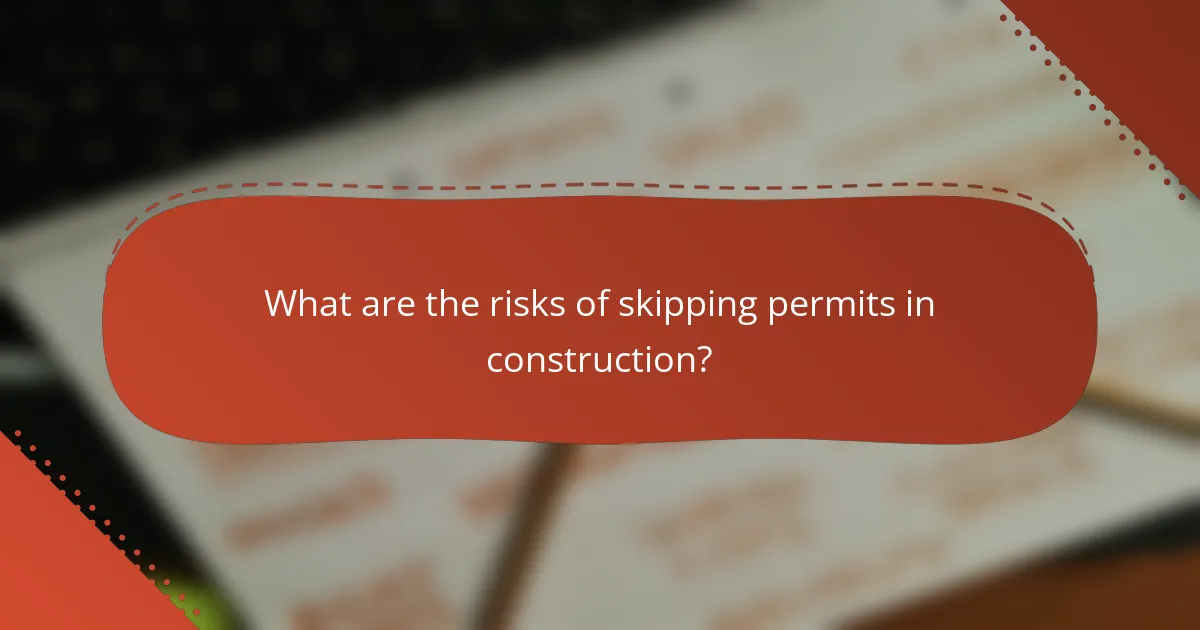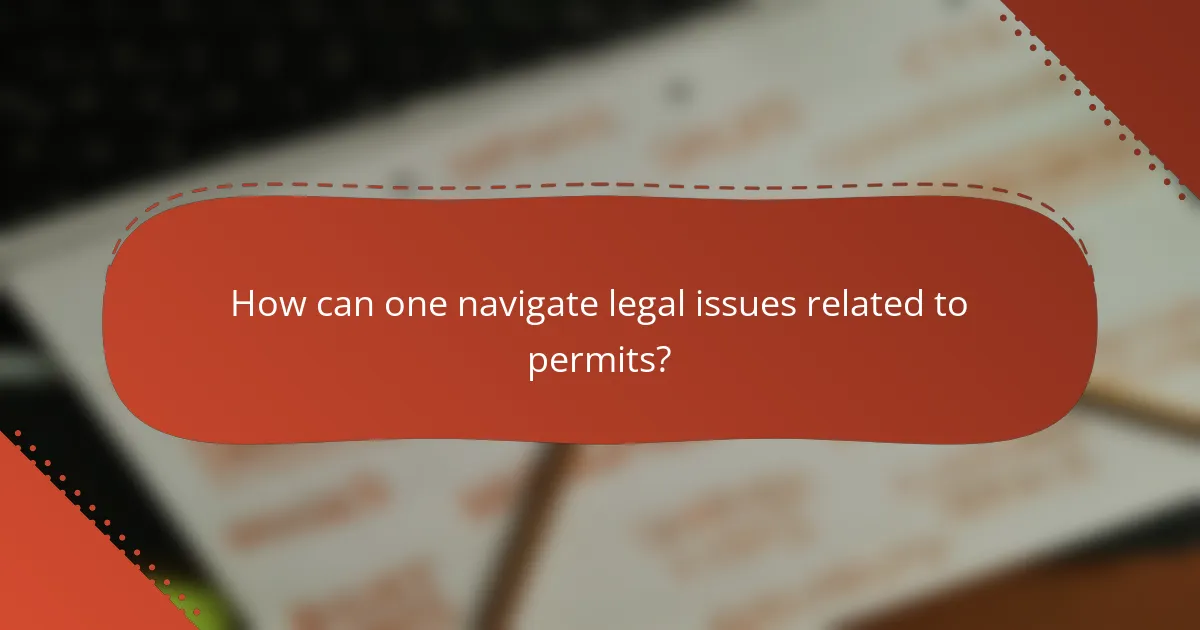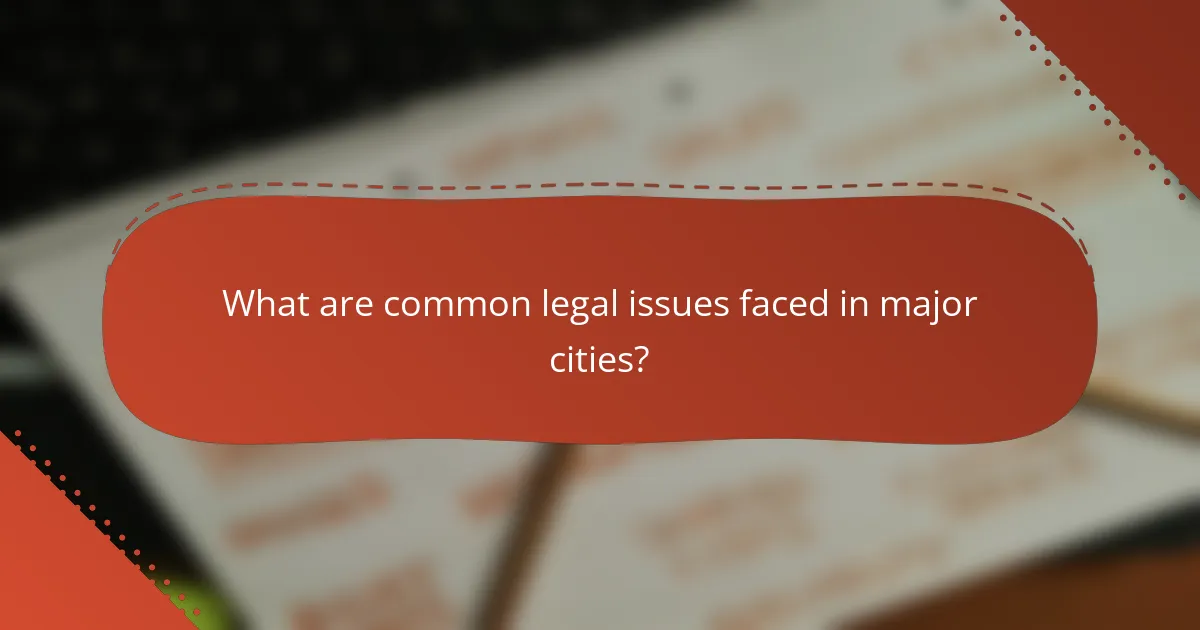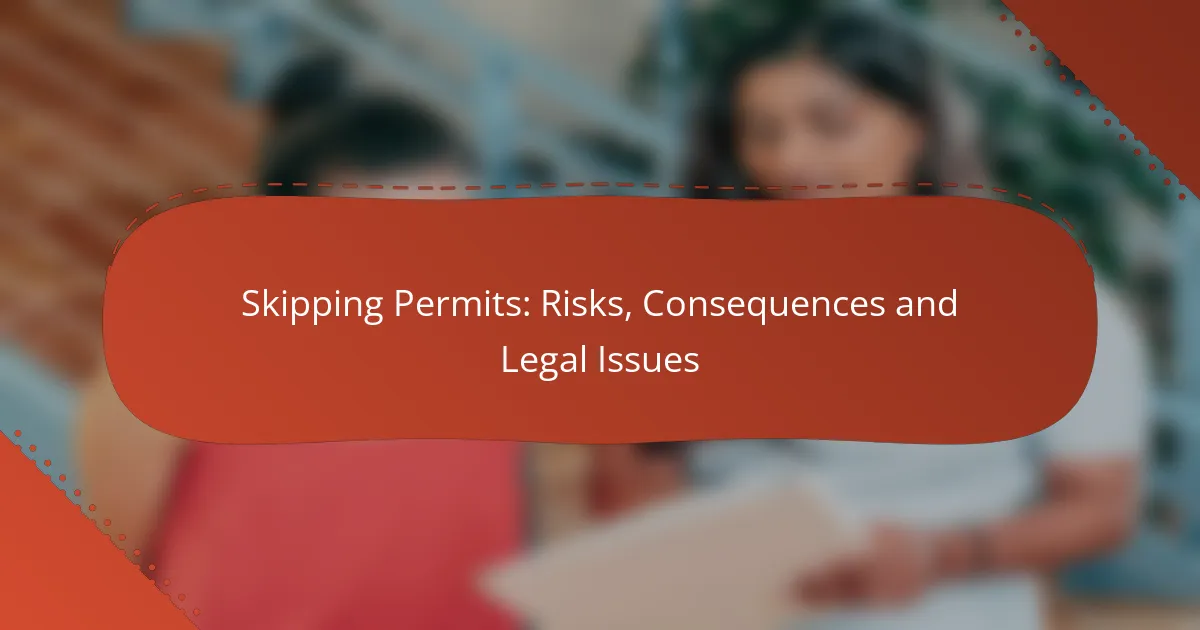Skipping permits in construction can result in serious legal and financial consequences, exposing builders and property owners to risks such as fines, project delays, and increased liability. Failure to obtain the necessary permits not only jeopardizes safety but can also lead to complications with insurance and negatively impact property value. To navigate these legal issues effectively, it is essential to consult experts, understand local regulations, and maintain thorough documentation.

What are the risks of skipping permits in construction?
Skipping permits in construction can lead to significant legal and financial repercussions. It exposes builders and property owners to various risks, including legal penalties, increased liability, safety hazards, property damage, and complications with insurance coverage.
Legal penalties
Failing to obtain necessary permits can result in hefty fines and legal action from local authorities. Depending on the jurisdiction, these fines can range from hundreds to thousands of dollars, and repeat offenses may lead to more severe penalties, including criminal charges.
Additionally, projects may be halted until the proper permits are secured, causing delays and increased costs. This can severely impact timelines and budgets, leading to further complications down the line.
Increased liability
Without the appropriate permits, property owners and contractors may face increased liability for accidents or injuries that occur on the job site. If an incident arises, insurance companies may deny claims, leaving the responsible party to cover costs out of pocket.
This liability extends to third parties as well; if a neighbor’s property is damaged due to unpermitted work, the owner may be held financially responsible for repairs and legal fees.
Safety hazards
Skipping permits can lead to unsafe construction practices, as permits often ensure compliance with building codes designed to protect public safety. Without these checks, structures may not meet essential safety standards, increasing the risk of accidents.
For example, improper electrical work or inadequate structural support can pose serious dangers to occupants and nearby residents. Ensuring compliance through permits helps mitigate these risks and promotes safer building practices.
Property damage
Unpermitted construction can result in property damage, both to the structure being built and to surrounding properties. If construction does not adhere to local regulations, it may lead to issues such as water damage, structural failure, or even neighborhood disputes.
In some cases, property owners may be required to dismantle or redo unpermitted work, leading to additional costs and potential damage to existing structures.
Insurance complications
Insurance policies often require compliance with local laws and regulations, including obtaining necessary permits. If a claim arises from unpermitted work, insurers may refuse to pay out, leaving property owners financially exposed.
Moreover, future insurance premiums may increase if a history of unpermitted work is discovered, impacting long-term financial planning for property owners and contractors alike.

What are the consequences of not obtaining permits?
Not obtaining permits can lead to significant legal and financial repercussions. Consequences may include fines, project delays, forced removal of work, and a negative impact on property value.
Fines and fees
Failing to secure the necessary permits often results in fines imposed by local authorities. These fines can vary widely, typically ranging from a few hundred to several thousand dollars, depending on the severity of the violation and local regulations.
In addition to fines, there may be administrative fees for processing violations or additional permits required after the fact. It’s crucial to factor these potential costs into your project budget to avoid unexpected financial burdens.
Project delays
Skipping permits can lead to significant project delays as authorities may halt work until compliance is achieved. This can extend timelines by weeks or even months, disrupting schedules and increasing costs.
Delays can also arise from the need to reapply for permits or rectify non-compliant work. Planning for potential delays is essential to maintain project momentum and meet deadlines.
Forced removal of work
In some cases, authorities may mandate the removal of work that was completed without the necessary permits. This can result in additional costs for demolition and reconstruction, as well as wasted resources.
Forced removal not only affects the immediate project but can also lead to legal disputes, further complicating the situation and incurring additional expenses.
Impact on property value
Not obtaining permits can negatively affect property value, as potential buyers may be wary of purchasing a property with unresolved legal issues. Properties with unpermitted work may be harder to sell or may sell for significantly less than market value.
Additionally, if a property is flagged for violations, it can deter future investment or development opportunities, impacting long-term financial returns.

How can one navigate legal issues related to permits?
Navigating legal issues related to permits requires a proactive approach that includes consulting experts, understanding local regulations, and maintaining thorough documentation. By taking these steps, individuals can minimize risks and ensure compliance with applicable laws.
Consult legal experts
Engaging with legal experts who specialize in permit regulations can provide invaluable guidance. They can help clarify complex legal language and identify potential pitfalls in the application process. This is especially important in areas with stringent permitting laws.
Consider scheduling a consultation to discuss your specific project and its requirements. A legal expert can help you understand the implications of skipping permits and the potential consequences, which may include fines or project delays.
Understand local regulations
Familiarizing yourself with local regulations is crucial for navigating permit-related legal issues. Each jurisdiction has its own set of rules governing permits, which can vary significantly. Researching these regulations can help you determine what permits are necessary for your project.
Utilize local government websites or contact municipal offices to gather information on required permits. This proactive approach can prevent costly mistakes and ensure that your project adheres to local laws.
Document all communications
Keeping detailed records of all communications related to permits is essential for legal protection. This includes emails, letters, and notes from meetings with officials or legal advisors. Documentation can serve as evidence if disputes arise regarding permit requirements or compliance.
Establish a systematic approach to organizing these documents, such as creating a dedicated folder for permit-related correspondence. This practice not only aids in clarity but also strengthens your position should any legal issues emerge in the future.

What are common legal issues faced in major cities?
Common legal issues in major cities often stem from regulatory compliance failures, particularly regarding permits. Skipping necessary permits can lead to significant legal challenges, including fines, project delays, and potential demolition of unauthorized structures.
Building code violations
Building code violations occur when construction does not adhere to established safety and structural standards. These codes vary by city but generally cover aspects like electrical systems, plumbing, and structural integrity. Failing to comply can result in hefty fines and mandatory remediation work.
For instance, if a building lacks proper fire safety measures, local authorities may impose penalties or require immediate upgrades to meet code requirements. Always consult local building regulations before starting any construction project to avoid these issues.
Zoning disputes
Zoning disputes arise when a property is used in a manner not permitted by local zoning laws. These laws dictate how land can be used, including residential, commercial, or industrial purposes. Engaging in activities that violate these regulations can lead to legal action from the city or neighboring property owners.
For example, converting a residential property into a commercial space without proper zoning approval can result in fines and the requirement to revert to the original use. Understanding local zoning laws is crucial to prevent disputes and ensure compliance.
Neighbor complaints
Neighbor complaints can significantly impact property projects, especially if they relate to noise, aesthetics, or safety concerns. In many cities, residents have the right to file complaints against properties that disrupt the neighborhood’s peace or violate local ordinances.
For instance, excessive noise from construction can lead to complaints that may halt work until issues are resolved. Engaging with neighbors before starting a project can help mitigate potential conflicts and foster goodwill, reducing the likelihood of complaints.
